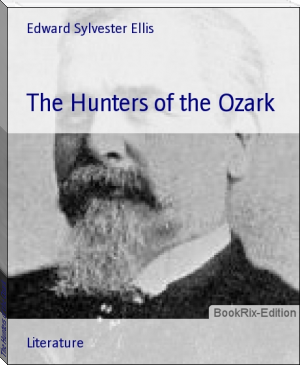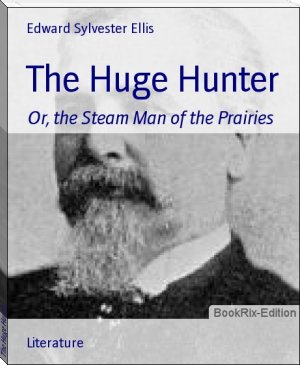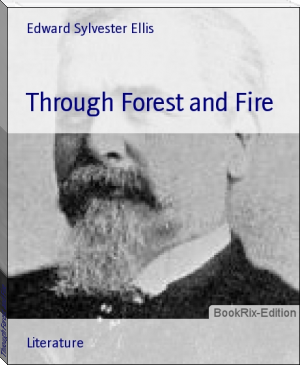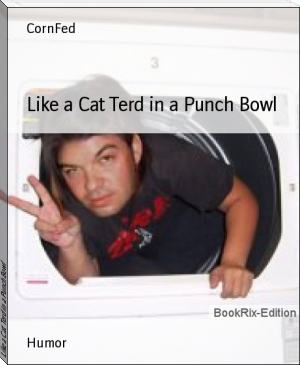The Hunters of the Ozark - Edward Sylvester Ellis (children's ebooks online .txt) 📗

- Author: Edward Sylvester Ellis
Book online «The Hunters of the Ozark - Edward Sylvester Ellis (children's ebooks online .txt) 📗». Author Edward Sylvester Ellis
die fighting.
The three horsemen advanced with the same deliberate pace, their black eyes fixed upon Fred, who stood erect, looking straight at them. When they were within twenty yards, he quietly turned so as to face the other way, and waved his cap several times over his head. At the same moment he uttered a resounding whoop, replaced his cap, laid Terry's rifle at his feet and leveled his own at the amazed savages, who could not have suspected what was coming.
You understand that the purpose of Fred was to make the Winnebagos believe that he had friends on the edge of the wood behind him to whom he had signaled. The act of laying down his gun was to give the impression that he was so sure of support that he was ready to fight until it should appear.
Now, the red men might have been deceived by this to as full an extent as the youth desired, but the fact remained that, even if there were re-enforcements on the margin of the prairie, they were so far off that they could give no help if the Indians chose to assail the boy. I am inclined to think that had the Winnebagos believed that a dozen white hunters were encamped there, they would not have been restrained from carrying out their design by such fact: but when the cool defiance of the youth was added to the same, there was enough to make them pause.
They might shoot him down, wheel and dash for the woods from which they had emerged but a short time before; but they would be liable to pursuit, and, when a white borderer takes to the trail, he can be as persistent as the red man himself, though, as I have said, had they been eager to shoot the boy, they would not have been stopped by that knowledge. But they saw that he had his loaded rifle leveled at them: each Winnebago probably imagined he would be the special target. Their guns were still in their hands and no doubt the moment any one attempted to raise his weapon the white boy would fire.
The distance was so short that there could be no miss. It followed therefore that the cost of an assault upon the lad would be the death of one of the Winnebagos, and none of the three could know that he would not be the victim.
The cost was more than they were willing to pay, for it must be borne in mind that not only was the death of one of their number considered assured, but it was not at all unlikely that such a daring youngster would be able to do something with the gun at his feet before succumbing.
But it is not to be supposed that three mounted Indians would deliberately ride away from a single youth through fear alone,--that is, not until they had tried to circumvent him by strategy. And so it came to pass that within the same minute that Fred raised his rifle, the Winnebago who sat in the middle waved his hand toward him as a sign of comity. At the same time he called out: "Yenghese! Long Knife! Friend--friend--friend!"
But Fred knew too much to be deceived. He was the master of more vigorous English, and, without lowering his gun, he called out:
"Keep off or I'll fire! If you ride another step, I'll let daylight through you!"
As if to add emphasis to his words, he gently swayed his rifle from right to left, so that it covered each warrior in turn. There was an involuntary ducking of the heads, and the Indians, seeing that nothing was to be done without large risk, opened out--two riding to the right and one to the left. Thus they passed by Fred without lessening the space between him and them.
After all, this was the most trying moment to the youth, for it diverted his attention in the most exasperating manner. The three horsemen were in his field of vision, but it was hard to keep watch upon each. He suspected the maneuver was for the purpose of taking him off his guard, but it is doubtful whether such was the case, for there was something in the grim pose of the youthful hunter which warned them that it was unsafe to trifle with him.
When the horsemen were opposite each other and on a line with Fred, he suddenly wheeled with great quickness and held his piece still leveled so that he could shift it from one to the other the moment needed. On their part, the Winnebagos watched him with cat-like vigilance, keeping their heads turned until they came together a hundred feet beyond, and between him and the wood which he had just left. There they stopped, their position such that the sides of their animals were turned toward the lad, whom they continued to view with an interest that it is safe to say they had never felt in any other of his race.
It was tiresome to hold his heavy rifle leveled, but Fred stuck to it, for he knew how much depended on the next minute or two.
It looked for a time as though the Winnebagos had decided not to leave without a demonstration, but finally they moved off with their backs toward Fred, and their horses on a walk.
"How nicely I could pick one of them off," said he to himself, as the broad shoulders, with the black hair streaming over them, moved gently up and down with the motion of the animals, and ranged themselves beside each other like three dusky targets. "I could hit _him_ or _him_ or _him_" he added, shifting his aim from one to the other in turn, "and it's because they know it that they are afraid to risk a shot. If one of them had made a motion to take aim, I would have let fly, and I wouldn't have missed either. Then I would have done something with Terry's gun."
These thoughts had hardly found expression, when the middle Winnebago suddenly turned on his horse, raised his gun and discharged it at Fred Linden. The instant he did so, he and his two companions threw themselves forward on their animals and dashed off on a dead run for the wood.
Had the warrior been less hurried, it is probable he would have struck the astonished youth, who plainly heard the _pinge_ of the bullet as it almost touched his ear. His own arms were beginning to ache because of their constrained position, but he took as careful aim as possible and fired at the savage who fired at him.
More than that, he hit him. A screeching yawp broke the stillness, the warrior half straightened up on his steed, seemed to sway, and would have fallen had not one of his companions caught his shoulder and supported him for a minute or two. The horses were brought down to a walk, and finally came to a standstill, though they halted at a point beyond rifle shot.
"I hope I finished him," muttered Fred Linden, with a snap of his eyes; "they are seeking my life, and, if I could have my way, I would tumble every one of them off his horse."
Never was the value of two rifles shown more strikingly than at this time. The moment his gun was discharged--had he possessed no other--Fred would have been helpless, and the Winnebagos would have been upon him before he could reload his piece; for that was in the days of flint-locks, when the charge had to be rammed down and the powder poured into the pan before the weapon was ready for use. It may be said, however, that under such circumstances he would not have fired.
But before the horsemen could wheel about, they would have found the youth standing at "present arms" precisely as before, and the situation unchanged, except that one of their own number had been disabled, and to that extent (which was considerable) the gain was on the side of the lad.
There could be little doubt that the stricken Winnebago was hit hard, though after some attention from his companions, he was able to sit his horse. The three warriors seemed to have lost all interest in Fred, for a few minutes later they rode off at a walk, without, so far as he could judge, once bestowing a look upon him.
It struck him as singular that after his stratagem, by which he believed he gave the impression that he had a party of friends on the margin of the wood, that the Winnebagos should guide their horses to the very point. After all, it began to look as though he was not so successful in that respect as he imagined, and that it was his own courageous demeanor that for the time had saved his life.
"I am glad they have ridden off in that direction," said the youth to himself, as he saw them carefully enter the wood, where they were lost from sight; "for if they had ridden the other way they would have bothered me in my hunt for Terry."
CHAPTER XXX.
TERRY FINISHES HIS RIDE.
That ride of Terry Clark on the back of the buffalo bull was one which he could never forget had he wished to do so, which of course he did not. The first thrill, when the beast dashed off on a dead run, and the wind began blowing by the ears of the lad, was that of pleasure. He was having an exciting ride, and, as good fortune would have it, the animal was bearing him straight along the trail toward the camp in the Ozarks.
"If the baste will show enough consideration for me," thought the lad, "to kape up his coorse for twinty miles or so, he will give me a good lift toward raichin' the folks, though sorry I am that I haven't Fred alongside or rather behind me."
The bull being on a run, his progress consisted of a series of quick jumps, which jarred the rider so much that had he not kept a good grip upon the shaggy mane, he would have been unseated. The hair of the animal was so long that he was able to make his hold secure, though he had a constant fear that he would stumble, in which case the rider was sure to take a tremendous header that was likely to break his neck.
Terry could feel the throb, as it may be called, of the engine. His position was such that his heels touched the body close to the shoulders of the bull. At that point there was an alternate swelling and sinking of the muscles, as the animal alighted on his feet and leaped away again, which Terry felt as plainly as if he had held his open hand on the shoulder. Then, too, the bull had a peculiar sidelong motion, as though some of his muscles occasionally got out of "gear," and the action of the hind legs did not "dovetail," so to speak, with that of the fore legs.
Nothing escaped the eye of Terry during those exciting minutes. He thought the head of the bull was held unusually low, but he noticed the short, thick horns, curving outward and then coming over until they ended within a few inches of each other, and he was sure that amid the dusty frontispiece of the immense area of skull bone he could see where his useless bullet had struck and glanced off; once or twice he caught a whiff of the breath of the buffalo, redolent with
The three horsemen advanced with the same deliberate pace, their black eyes fixed upon Fred, who stood erect, looking straight at them. When they were within twenty yards, he quietly turned so as to face the other way, and waved his cap several times over his head. At the same moment he uttered a resounding whoop, replaced his cap, laid Terry's rifle at his feet and leveled his own at the amazed savages, who could not have suspected what was coming.
You understand that the purpose of Fred was to make the Winnebagos believe that he had friends on the edge of the wood behind him to whom he had signaled. The act of laying down his gun was to give the impression that he was so sure of support that he was ready to fight until it should appear.
Now, the red men might have been deceived by this to as full an extent as the youth desired, but the fact remained that, even if there were re-enforcements on the margin of the prairie, they were so far off that they could give no help if the Indians chose to assail the boy. I am inclined to think that had the Winnebagos believed that a dozen white hunters were encamped there, they would not have been restrained from carrying out their design by such fact: but when the cool defiance of the youth was added to the same, there was enough to make them pause.
They might shoot him down, wheel and dash for the woods from which they had emerged but a short time before; but they would be liable to pursuit, and, when a white borderer takes to the trail, he can be as persistent as the red man himself, though, as I have said, had they been eager to shoot the boy, they would not have been stopped by that knowledge. But they saw that he had his loaded rifle leveled at them: each Winnebago probably imagined he would be the special target. Their guns were still in their hands and no doubt the moment any one attempted to raise his weapon the white boy would fire.
The distance was so short that there could be no miss. It followed therefore that the cost of an assault upon the lad would be the death of one of the Winnebagos, and none of the three could know that he would not be the victim.
The cost was more than they were willing to pay, for it must be borne in mind that not only was the death of one of their number considered assured, but it was not at all unlikely that such a daring youngster would be able to do something with the gun at his feet before succumbing.
But it is not to be supposed that three mounted Indians would deliberately ride away from a single youth through fear alone,--that is, not until they had tried to circumvent him by strategy. And so it came to pass that within the same minute that Fred raised his rifle, the Winnebago who sat in the middle waved his hand toward him as a sign of comity. At the same time he called out: "Yenghese! Long Knife! Friend--friend--friend!"
But Fred knew too much to be deceived. He was the master of more vigorous English, and, without lowering his gun, he called out:
"Keep off or I'll fire! If you ride another step, I'll let daylight through you!"
As if to add emphasis to his words, he gently swayed his rifle from right to left, so that it covered each warrior in turn. There was an involuntary ducking of the heads, and the Indians, seeing that nothing was to be done without large risk, opened out--two riding to the right and one to the left. Thus they passed by Fred without lessening the space between him and them.
After all, this was the most trying moment to the youth, for it diverted his attention in the most exasperating manner. The three horsemen were in his field of vision, but it was hard to keep watch upon each. He suspected the maneuver was for the purpose of taking him off his guard, but it is doubtful whether such was the case, for there was something in the grim pose of the youthful hunter which warned them that it was unsafe to trifle with him.
When the horsemen were opposite each other and on a line with Fred, he suddenly wheeled with great quickness and held his piece still leveled so that he could shift it from one to the other the moment needed. On their part, the Winnebagos watched him with cat-like vigilance, keeping their heads turned until they came together a hundred feet beyond, and between him and the wood which he had just left. There they stopped, their position such that the sides of their animals were turned toward the lad, whom they continued to view with an interest that it is safe to say they had never felt in any other of his race.
It was tiresome to hold his heavy rifle leveled, but Fred stuck to it, for he knew how much depended on the next minute or two.
It looked for a time as though the Winnebagos had decided not to leave without a demonstration, but finally they moved off with their backs toward Fred, and their horses on a walk.
"How nicely I could pick one of them off," said he to himself, as the broad shoulders, with the black hair streaming over them, moved gently up and down with the motion of the animals, and ranged themselves beside each other like three dusky targets. "I could hit _him_ or _him_ or _him_" he added, shifting his aim from one to the other in turn, "and it's because they know it that they are afraid to risk a shot. If one of them had made a motion to take aim, I would have let fly, and I wouldn't have missed either. Then I would have done something with Terry's gun."
These thoughts had hardly found expression, when the middle Winnebago suddenly turned on his horse, raised his gun and discharged it at Fred Linden. The instant he did so, he and his two companions threw themselves forward on their animals and dashed off on a dead run for the wood.
Had the warrior been less hurried, it is probable he would have struck the astonished youth, who plainly heard the _pinge_ of the bullet as it almost touched his ear. His own arms were beginning to ache because of their constrained position, but he took as careful aim as possible and fired at the savage who fired at him.
More than that, he hit him. A screeching yawp broke the stillness, the warrior half straightened up on his steed, seemed to sway, and would have fallen had not one of his companions caught his shoulder and supported him for a minute or two. The horses were brought down to a walk, and finally came to a standstill, though they halted at a point beyond rifle shot.
"I hope I finished him," muttered Fred Linden, with a snap of his eyes; "they are seeking my life, and, if I could have my way, I would tumble every one of them off his horse."
Never was the value of two rifles shown more strikingly than at this time. The moment his gun was discharged--had he possessed no other--Fred would have been helpless, and the Winnebagos would have been upon him before he could reload his piece; for that was in the days of flint-locks, when the charge had to be rammed down and the powder poured into the pan before the weapon was ready for use. It may be said, however, that under such circumstances he would not have fired.
But before the horsemen could wheel about, they would have found the youth standing at "present arms" precisely as before, and the situation unchanged, except that one of their own number had been disabled, and to that extent (which was considerable) the gain was on the side of the lad.
There could be little doubt that the stricken Winnebago was hit hard, though after some attention from his companions, he was able to sit his horse. The three warriors seemed to have lost all interest in Fred, for a few minutes later they rode off at a walk, without, so far as he could judge, once bestowing a look upon him.
It struck him as singular that after his stratagem, by which he believed he gave the impression that he had a party of friends on the margin of the wood, that the Winnebagos should guide their horses to the very point. After all, it began to look as though he was not so successful in that respect as he imagined, and that it was his own courageous demeanor that for the time had saved his life.
"I am glad they have ridden off in that direction," said the youth to himself, as he saw them carefully enter the wood, where they were lost from sight; "for if they had ridden the other way they would have bothered me in my hunt for Terry."
CHAPTER XXX.
TERRY FINISHES HIS RIDE.
That ride of Terry Clark on the back of the buffalo bull was one which he could never forget had he wished to do so, which of course he did not. The first thrill, when the beast dashed off on a dead run, and the wind began blowing by the ears of the lad, was that of pleasure. He was having an exciting ride, and, as good fortune would have it, the animal was bearing him straight along the trail toward the camp in the Ozarks.
"If the baste will show enough consideration for me," thought the lad, "to kape up his coorse for twinty miles or so, he will give me a good lift toward raichin' the folks, though sorry I am that I haven't Fred alongside or rather behind me."
The bull being on a run, his progress consisted of a series of quick jumps, which jarred the rider so much that had he not kept a good grip upon the shaggy mane, he would have been unseated. The hair of the animal was so long that he was able to make his hold secure, though he had a constant fear that he would stumble, in which case the rider was sure to take a tremendous header that was likely to break his neck.
Terry could feel the throb, as it may be called, of the engine. His position was such that his heels touched the body close to the shoulders of the bull. At that point there was an alternate swelling and sinking of the muscles, as the animal alighted on his feet and leaped away again, which Terry felt as plainly as if he had held his open hand on the shoulder. Then, too, the bull had a peculiar sidelong motion, as though some of his muscles occasionally got out of "gear," and the action of the hind legs did not "dovetail," so to speak, with that of the fore legs.
Nothing escaped the eye of Terry during those exciting minutes. He thought the head of the bull was held unusually low, but he noticed the short, thick horns, curving outward and then coming over until they ended within a few inches of each other, and he was sure that amid the dusty frontispiece of the immense area of skull bone he could see where his useless bullet had struck and glanced off; once or twice he caught a whiff of the breath of the buffalo, redolent with
Free e-book «The Hunters of the Ozark - Edward Sylvester Ellis (children's ebooks online .txt) 📗» - read online now
Similar e-books:





Comments (0)